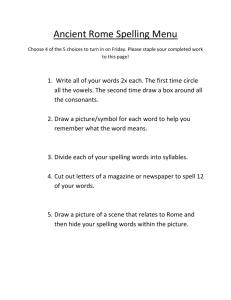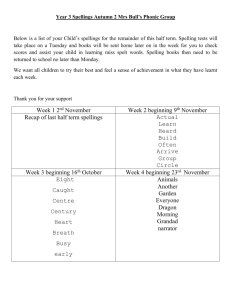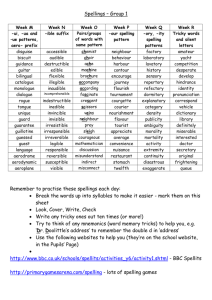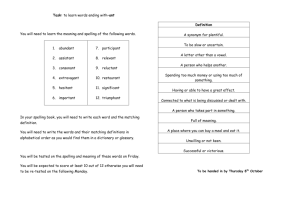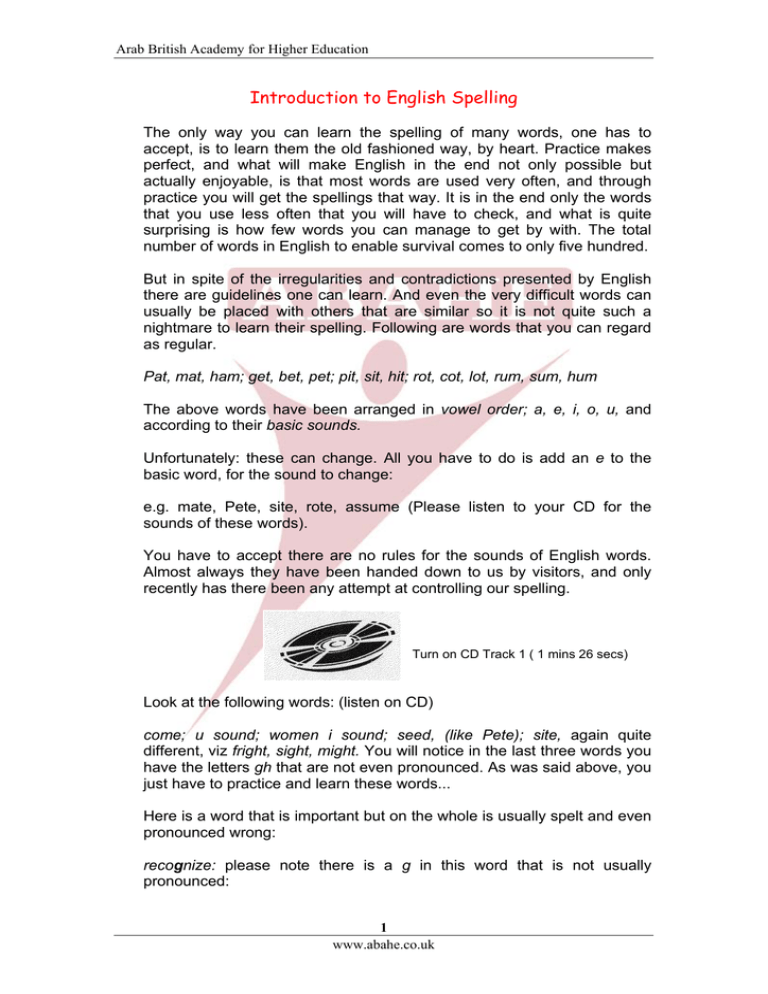
Arab British Academy for Higher Education
Introduction to English Spelling
The only way you can learn the spelling of many words, one has to
accept, is to learn them the old fashioned way, by heart. Practice makes
perfect, and what will make English in the end not only possible but
actually enjoyable, is that most words are used very often, and through
practice you will get the spellings that way. It is in the end only the words
that you use less often that you will have to check, and what is quite
surprising is how few words you can manage to get by with. The total
number of words in English to enable survival comes to only five hundred.
But in spite of the irregularities and contradictions presented by English
there are guidelines one can learn. And even the very difficult words can
usually be placed with others that are similar so it is not quite such a
nightmare to learn their spelling. Following are words that you can regard
as regular.
Pat, mat, ham; get, bet, pet; pit, sit, hit; rot, cot, lot, rum, sum, hum
The above words have been arranged in vowel order; a, e, i, o, u, and
according to their basic sounds.
Unfortunately: these can change. All you have to do is add an e to the
basic word, for the sound to change:
e.g. mate, Pete, site, rote, assume (Please listen to your CD for the
sounds of these words).
You have to accept there are no rules for the sounds of English words.
Almost always they have been handed down to us by visitors, and only
recently has there been any attempt at controlling our spelling.
Turn on CD Track 1 ( 1 mins 26 secs)
Look at the following words: (listen on CD)
come; u sound; women i sound; seed, (like Pete); site, again quite
different, viz fright, sight, might. You will notice in the last three words you
have the letters gh that are not even pronounced. As was said above, you
just have to practice and learn these words...
Here is a word that is important but on the whole is usually spelt and even
pronounced wrong:
recognize: please note there is a g in this word that is not usually
pronounced:
1
www.abahe.co.uk
Arab British Academy for Higher Education
Another difficult word is:
controversy: You will notice I have put an accent on the o; this is not part
of the English spelling, but that is where I prefer to stress the word.
However, many people prefer to say:
controversy, stressing the first syllable: Please listen to the CD for a
comparison.
Then there are words which vary according to their purpose:
Practice = name of the action; practise = the action itself.
What is difficult about this word is that the two forms are pronounced
exactly the same. I often have to check which spelling is right; (See
Lesson 24 for Use of Dictionary)
A word that will help is:
advice = name; advise = action; this is easier as in advise, the s is
pronounced like a z
pronunciation is another nightmare; many people say (wrongly):
pronounciation: English constantly cheats!
A very good book for those anxious to improve their spelling
is:
Spelling it out by Rhyannedd Pratley (BBC Books). This may
not be in print (though it is worth checking) but you should
be able to get it in a good public library.
Another excellent book definitely out of print but available
in libraries is:
Basic English by Charles Duff.
This is the classic on English which shows how our language
can be expressed fully in 500 words... Amazing!
Please note the following words whose sound and spelling are quite
different: your CD will present the spoken word...
through; rough; bough; trough; thorough; borough...
And as a side-mention you have even:
2
www.abahe.co.uk
Arab British Academy for Higher Education
Wednesday, people, friend, whose look and spelling bear very little
resemblance to each other...
Another problem with English is of course the plurals: we have mentioned
women where the o sounds like an i; even odder is the singular where the
o is pronounced u.. woman.
And of course you have man - men; child - children; mouse - mice; ox oxen;
Fish - fish; sheep - sheep, the last two being the same!
And of course you have words that sound the same but are spelt
differently:
bow - bough; sleigh - slay; know - no; veil - vale
We have to accept that English is just a mass of contradictions and it is
more or less impossible to give fixed rules of pronunciation.
Turn on CD Track 2 ( 1 min 21 secs)
Activity
1
Answer the following questions.
Please listen to your CD and see how many of the words in
your first Activity you can spell. The words given in this
lesson may be used as a guide.
One has to accept that in order to improve our written and spoken
English, it is necessary to read as much as possible, from newspapers to
books, and listen attentively to good English. The best sources of good
English have to be your radio and television, where the announcers are
trained to speak English correctly. It might be a good idea to listen
especially to news reports, and try and write down the words as they are
spoken. An excellent programme to watch for use of words is Countdown
on Channel Four every weekday at 4.15 pm. You could contact your
Tutor, to see if you are getting the spellings correctly.
One amusing anecdote on spelling for anyone interested in detective
fiction is Agatha Christie’s first published detective story: The Mysterious
3
www.abahe.co.uk
Arab British Academy for Higher Education
Affair at Styles in which at the beginning we are shown a scrap of paper
where the murder victim was trying to spell possessed: she had at least
three tries before she got it correct! So you can see English spelling
problems are definitely not new.
Turn on CD Track 3 ( 1 min 01
secs)
Activity
2
There are many words which sound fairly different from
the way they look: here are some examples.
Please listen to the words correctly pronounced on your CD.
After that write them down without looking at this list, to
make sure you know how to spell them.
women, pronunciation, recognise, town, cough, allow,
English, wonder, medicine, thorough, chew, move, one,
picture, photography, teacher, school, possessive, defiant
And here is your final Activity. There is no Key but you can check yourself,
and do consult your Tutor if there are any spellings or meanings of words
generally that are bothering you, before you go on to the next Lesson on
the shape of English and ‘What makes English tick...’
Activity
3
Please follow the instructions below
Now try writing down as many similar words as you can,
checking spellings in your dictionary. If you are uncertain
about using it, by all means check Lesson 24 which has
hints on using the dictionary.
4
www.abahe.co.uk
Arab British Academy for Higher Education
KEY
Activity One
Pronunciation, possessions, photographer, medicine, professor, until, till,
already, alright, (all right)
break/brake; flower/flour; site/sight; right/write; knight/night; might/mite;
hole/whole; seem/seam; farther/father; peace/piece.
Activity Two
Women, pronunciation, recognize, town, cough, allow, English, wonder,
medicine, thorough, chew, move, one, picture, photography, teacher,
school, possessive, defiant.
All Rights Reserved © Arab British Academy for Higher Education
5
www.abahe.co.uk

